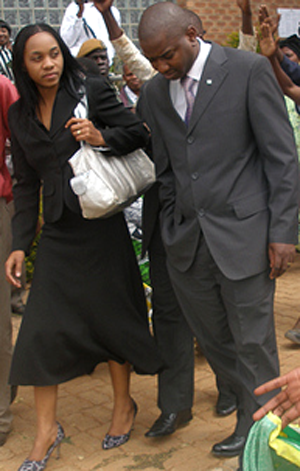Geisy Arruda & Chansa Kabwela: Brazil & Zambia Write Different Scripts on Women's Rights Cases
/ Geisy Arruda reinstated at university after dress debacle.Geisy Arruda has been reinstated at Bandeirante University in Sao Bernardo do Campo, Brazil for wearing this dress, which caused an uproar in a tropical nation where skin is in.
Geisy Arruda reinstated at university after dress debacle.Geisy Arruda has been reinstated at Bandeirante University in Sao Bernardo do Campo, Brazil for wearing this dress, which caused an uproar in a tropical nation where skin is in.
A 20-year-old tourism student, Arruda was expelled from the school for ‘parading provocatively’ around the school.
Arruda said just before Monday’s decision that she was humiliated by the experience and was never warned by university officials that her dress was too racy, according to Agencia Estado.
“If a security guard or a professor had told me something I would have humbly returned home and changed my clothes,” she said, accompanied by seven lawyers at a packed press conference. via AP
The university denies Arruda’s comments, insisting that she was warned. University officials insist that the problem was Arruda’s attitude, not her dress.
I want to note the difference between Ms. Arruda’s experience and the probable flogging she would have experienced in many parts of the world.
1. The Brazilian government backed Arruda. The Brazilisn Education Ministry gave University officials 10 days to clarify the precise reasons for her expulsion.
3. The expulsion drew widespread protests online, with supporters framing their Twitter profile photos in pink. Videos of students ridiculing and cursing Arruda turned up on the Web, drawing attention to the Oct. 22 incident. Some hecklers will be expelled.
Geisy Arruda doesn’t know if she will return to Bandeirante University, out of concerns for her safety. She has received offers of fully-paid scholarships from two other universities.
The events of the Geisy Arruda case in Brazil can and should be examined against the Lubna Hussein trial in Sudan and the return of Chansa Kabwela to the courtroom in Zambia on Nov. 16.
Chansa Kabwela Case in Zambia
 Chansa Kabwela will return to court in Zambia on Nov. 16, 2009On Monday, Nov. 9, 2009 the editor-in-chief of Zambian daily the Post, and International Press Institute (IPI) member, Fred M’membe, appeared in court in the Zambian capital Lusaka on Monday on contempt charges brought after the newspaper published an op-ed in August 2009 about an ongoing ‘obscenity’ case against the Post editor Chansa Kabwela.
Chansa Kabwela will return to court in Zambia on Nov. 16, 2009On Monday, Nov. 9, 2009 the editor-in-chief of Zambian daily the Post, and International Press Institute (IPI) member, Fred M’membe, appeared in court in the Zambian capital Lusaka on Monday on contempt charges brought after the newspaper published an op-ed in August 2009 about an ongoing ‘obscenity’ case against the Post editor Chansa Kabwela.
In the piece, entitled “The Chansa Kabwela case: a comedy of errors,” Cornell University law professor Muna Ndulo criticised the charges brought against Kabwela after she sent photographs of a woman giving birth in the street to the country’s vice president and health minister, as well as other officials, to draw attention to the consequences of a health sector strike. She faces up to five years in prison if found guilty. The photos were never published by her newspaper. via International Press Institute.
The contemptible article is posted here on Zambian Economist.
The Zambian court adjourned Monday’s contempt case until tomorrow. Kabwels, who is facing five years in prison, will return to court next Monday.
These two cases, one in Brazil and the other in Zambia highlight the vast differences in women’s rights cases from one region to another. Although its economy is robust, Brazil remains a developing country like Zambia.
Most often the media and individual governments position the women’s rights issues as cultural differences between America and Europe and developing countries who remain more conservative.The West is seen as having no morals.
In these two tandem cases, we see vast differences in how two developing world governments handle a simple women’s rights issue. I make no claims at all regarding the overall place of women’s rights in either country.
In last week’s World Economic Forum Global Gender Gap report, Brazil received a rank of 82 and Zambia received a 107 out of 134 nations. Anne
More reading: Lubna Hussein, Chansa Kabwela, 20 Women Stripped to Their Underwear in Uganda: Are the World’s Male Morality Squads Coming Unhinged? Anne’s Journal




















































